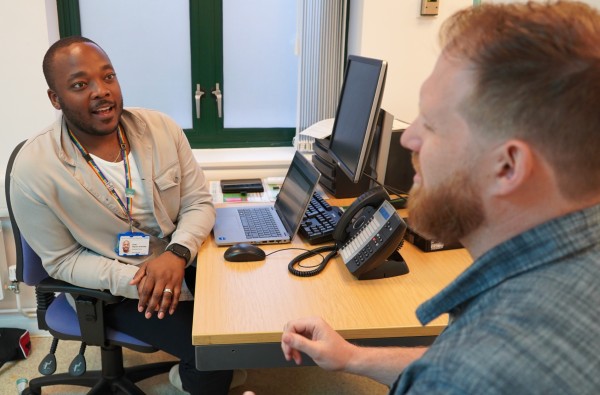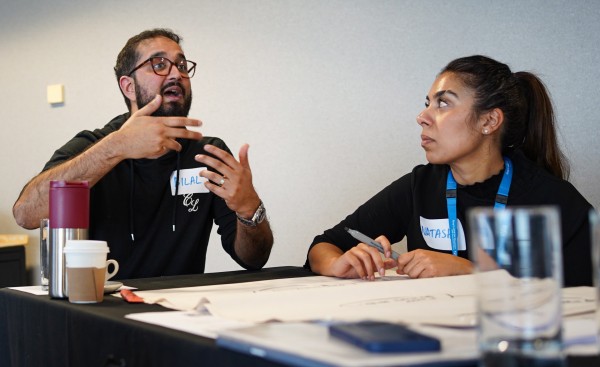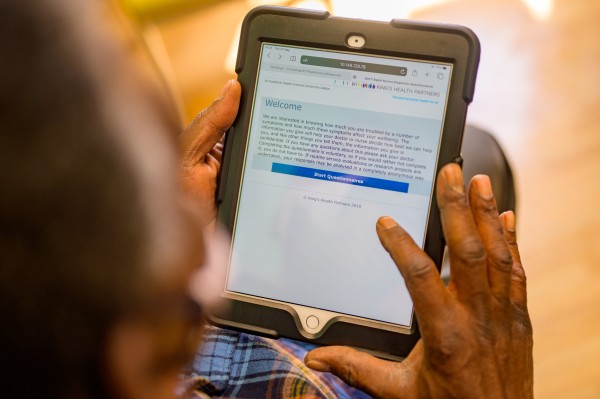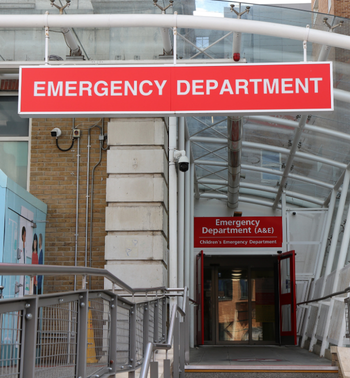The Mind & Body Programme drives the integration of mental and physical healthcare through evidencing and evaluating initiatives, and implementing and scaling successful pilots.
Our vision
Everyone deserves healthcare that seamlessly and proactively integrates mental, physical, and social care. We want to create an NHS where:
- whole-person care is prioritised, with patients supported to manage their condition holistically and prevent ill-health;
- staff possess deep knowledge of mind and body care and an understanding of routes to access mental health support from physical health settings and vice versa;
- evidence-based approaches promote bio-psycho-social integration, encourage the eradication of stigma, and address health disparities;
- patient outcomes, experiences, access, health inequalities, and service quality see significant improvement.
Our mission
To drive transformation in mind and body care locally through innovation, education, and collaboration, while sharing good practice nationally and internationally.
Aim one: evidence and evaluate
Build a robust evidence base for mind and body interventions, evaluating and demonstrating their impact on patient experience, outcomes, access and healthcare utilisation.
- Test innovative approaches to mind and body care, considering physical health, mental health and social factors, and working to address health inequalities;
- Evaluate impact of mind and body approaches, including on patient outcomes, experience, access and wider health economics.
Aim two: implement
Collaborate with partners across south east London to encourage the adoption of successfully piloted interventions.
- Understand the barriers to implementing successful pilot projects, and collaborate with partners to support adoption of good practice mind and body care;
- Share evidence to influence funding and decision-making to support mind and body implementation.
Aim three: scale
Encourage scaling up and spreading of successful interventions across south east London and beyond, so that mind and body care becomes standard practice.
- Develop resources and networks to support large-scale adoption of mind and body care;
- Collaborate with regional and national organisations to drive national knowledge and skills for mental and physical healthcare integration.
These are the key supporting factors that will enable us to achieve our vision and priorities:
Mind & Body Improvement Network
- Develop standard approaches to mind and body care based on shared learning from successes and failures, and develop resources to support implementation of these approaches;
- Create cultural change within organisations and support staff to change the way care is delivered.
Education
- Build awareness of the clinical benefits of mental and physical healthcare integration, and skills for delivering mind and body care amongst all staff;
- Collaborate with education providers to develop robust and far-reaching education resources and packages.
Engaging patients, carers, and communities
- Undertake genuine involvement, meaningfully adopting insights and experiences to inform proposed changes and their implementation, collaborating and co-delivering where possible;
- Actively pursue relationships with patients, carers, and communities from seldom-heard populations.
Sustainable funding
-
Support efforts to secure charitable and transformation funding to enable testing, implementing and scaling of mind and body care approaches.
Find out more about our work
Together our leadership team works to refresh and refocus the Mind & Body programme’s strategic approach and long term goals.
Dr Siobhan Gee MPharm PGDip MRPharmS (consultant) Ph.D
Dr Siobhan Gee is the acting deputy director of pharmacy and consultant pharmacist for psychiatric liaison at South London and Maudsley NHS Foundation Trust. She is an honorary senior lecturer in psychopharmacology at the Faculty of Life Sciences and Medicine, King's College London, and is accredited as consultant pharmacist by the Royal Pharmaceutical Society – one of the first people to receive this accolade.
Dr Siobhan Gee's specialist interest is in the use of psychiatric medicines for people with physical comorbidity, and she has more than a decade of experience working with psychiatric liaison teams at Guy’s and St. Thomas’ NHS FT, King’s College Hospital NHS FT, Croydon University Hospital Trust, and Lewisham Hospitals. She is recognised internationally as a leading authority in the clinical use of psychiatric medicines, and is a contributing author to the world-renowned Maudsley Prescribing Guidelines.
Mark Edwards (MBBS, BSc (Hons), PhD, FRCP), Professor of Neurology and Interface Disorders at King’s College London and Honorary Consultant Neurologist at Maudsley Hospital and King’s College Hospital
He has a specialist clinical and research interest in Movement Disorders and Functional Neurological Disorder (FND). He is a Senior Lecturer and Honorary Consultant Neurologist at UCL and the National Hospital for Neurology. Here he developed an NIHR funded research program and specialist diagnostic and treatment service for patients with FND. In 2015 he expanded this work to develop one of the first integrated diagnostic and treatment services for FND. Alongside this work he continued research into the pathophysiology of the disorder and development and testing of novel treatments, including the first randomised trial of specialist physiotherapy for functional movement disorders. He recently led the development of a national optimal clinical pathway for Functional Neurological Disorder for the National Neurology Advisory Group on behalf of NHS England.
He has published over 350 peer reviewed publications and is author of the Oxford Specialist Handbook of Parkinson’s Disease and Other Movement Disorders. He is President of the Association of British Neurology Movement Disorders Group, International Executive Committee member of the International Parkinson’s and Movement Disorders Society, Board and Founding Member of the Functional Neurological Disorder Society and Associate Editor of the European Journal of Neurology.
To find out more about the Mind & Body programme please email mindandbody
To discuss collaboration opportunities contact charlotte.











